'Dundee United job set me back... I was getting linked with Hibs': Ray McKinnon bidding to save Forfar after heart attack he never knew he had
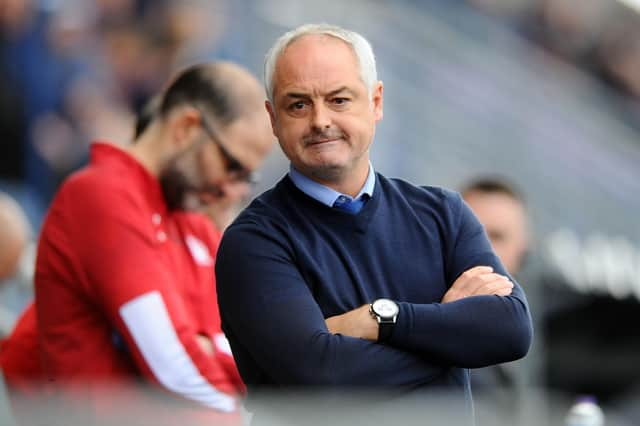

He was at a stage of his life when, owing to circumstances as much as anything, he was finally managing to slow down. The problem with stopping to smell the flowers, Ivan Golac-style, is the risk of being walloped in the backside.
McKinnon didn’t see it coming. His life didn’t flash before his eyes. And, given his eventful career….that hat-trick of free-kicks down at Kilmarnock...being told off by a naked Brian Clough at Nottingham Forest..being told off by a (usually fully clothed) Jim McLean at Dundee United…those 'Judas!' posters at Greenock Morton…it's fair to say any film reel of his life would have taken a while to get through.
Advertisement
Hide AdAdvertisement
Hide AdMercifully, there’s more to come. McKinnon, 52, has lived to tell the tale. He remains as sharp and as cogent ever. Conversation only stalls once, on account of the Non-Disclosure Agreement he signed following his shock departure from Queen's Park in July last year after delivering the League Two title. "An interesting time …..," he says. We move on.
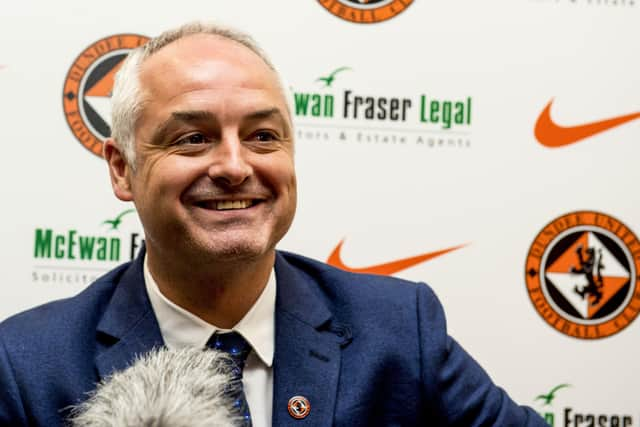

Severing ties with Queen's Park led to a spell out of the game and the opportunity to spend some time on himself. "I went to Dubai with (former Dundee United teammate) Grant Johnson playing golf,” says McKinnon. “I played golf right through the summer with friends from Carnoustie and Monifieth. I was a golf fanatic! I was doing a lot of golfing, enjoying life – stress free.”
His world turned upside down in May. “It was totally out of the blue,” he says. He had suffered some chest pain while out on a run. ‘That’s strange,’ he thought. He put it down to a loss of fitness, perhaps after being out in Dubai. He forced himself to complete the run and went out again a couple of days later.
“Obviously I was conscious to see how my chest was," he says. "Again, when I started running, my chest was getting a bit sore. But I got into my run and felt amazing.”
He finished and went home and then that night found he could not get comfortable in bed. “It was a bit of a restless night, but nothing to complain about. Then, when I got up in the morning, I just had a cold sweat, that feeling I was going to pass out. I googled it: 'sore chest and cold sweat’.
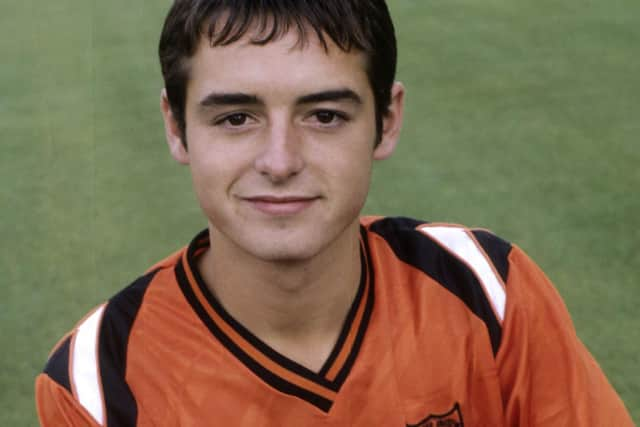

It said you may have just had a heart attack or you’re going to have one. (But) I was feeling fine, so I went about my business.”
He drove his son, Matt, to his work as a physical trainer at the gym owned by McKinnon's sister and then headed out to the golf course, where he thought he had mislaid a key. Only then did he think it might be sensible to head into hospital, where he explained his symptoms while apologising for causing anyone any trouble.
“Blood pressure was fine," he says. "The ECG was completely normal. The doctor came over and said it doesn’t look like you’ve had a heart attack at all. But he wanted to do a blood test just to make sure. And then a trauma came in and he disappeared. When he came back, he was looking at me in disbelief: 'you’ve had a heart attack!' I was in disbelief!
Advertisement
Hide AdAdvertisement
Hide Ad"We were sitting looking at each other, how’s that possible? When? I don’t remember having it?”
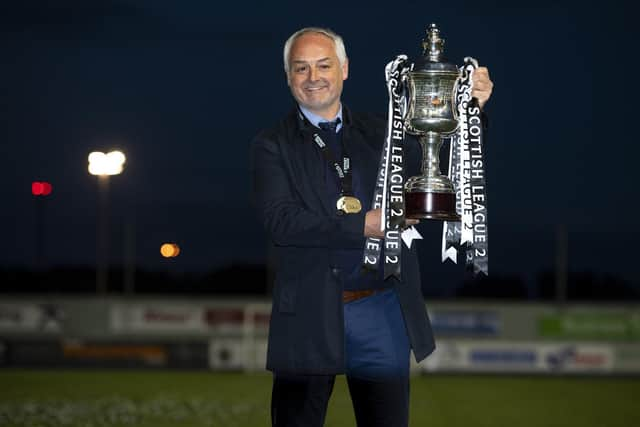

McKinnon was told there was a blockage in his right artery, which could have been very serious indeed. “The heart was pumping and working perfectly, there was no damage to the heart which was great," he says. "They put a stent in to fix the blockage in the right artery and, 40 minutes later, I was back in the ward and away home. Incredible.”
He is now battling nothing more than a slightly bothersome cold. Aside from that, he’s a picture of health as he walks into the Dundee cafe where we have arranged to meet for a coffee (he opts for peppermint tea in actual fact).
McKinnon smiles as he remembers his past as a supposed wild child of Scottish football (weren’t they all wild at Dundee United back then, or at least so it seemed?) The new breed, as the talented, confident lot dubbed themselves, played hard on and off the pitch at United in the early 1990s.
Jim McLean was the almost permanently harassed taskmaster, but he seemed to have a soft spot for McKinnon, who grew up in the Linlathen area of Dundee (the family moved to Canada for a few years weeks after he was born, returning when he was four). McLean would often give McKinnon his place, even if that wasn’t always immediately obvious at the time.
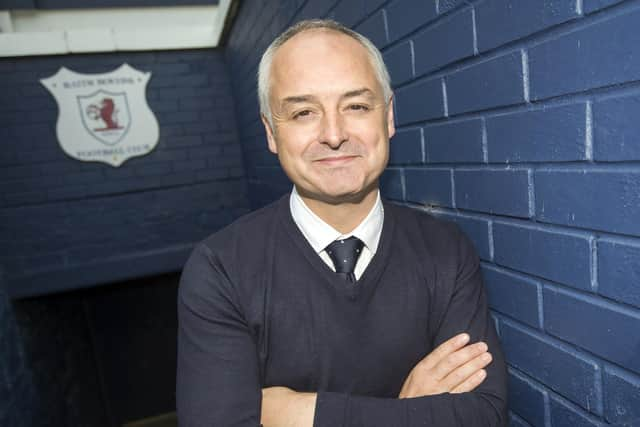

He once sent the young midfielder out of his office for a display of impertinence. McKinnon had made the seeming mistake of wondering why McLean had bothered to pick him “if it was only to watch the ball sail over my head”. He fully expected to pay for it by being exiled from the team again.
Instead, McKinnon was pleasantly surprised to hear McLean, in his team talk prior to the next game, ordering players of David Narey’s stature not to miss the young midfielder out when playing the ball up the park. "He had listened, I loved him for that," he says now.
Clough didn’t get the opportunity to take to McKinnon in quite the same way. He suffered cruel luck with injuries after making the move to Nottingham Forest in 1992. McLean was on the phone regularly, trying to coax him back. This continued when McKinnon moved to Aberdeen.
Advertisement
Hide AdAdvertisement
Hide Ad“I probably shouldn’t say that now, it was probably tapping up,” he says. “He would be asking how I was, and ‘will you come back?’ I was injured for about nine months at Forest. He invited me up and I remember he was trying to get me to go for a pre-match meal with the players, my old teammates! And I was like: ‘I can’t! C’mon..’”
McKinnon did go back, but after McLean had stepped down as manager and then, remarkably, he returned once more, this time in the role of one of McLean’s successors. He was another in the line of those who struggled to marry the club’s on-field deeds with the expectations generated by the legendary manager’s great era.
McKinnon still struggles to process his own time in charge at Tannadice. He was the manager-of-the-moment having led Raith Rovers to fourth place in the Championship to great acclaim in 2016. They lost out narrowly to Hibs in the play-off quarter-final. United, meanwhile, had just been relegated to the same division.
Having already spoken about regrets while covering his health scare, McKinnon returns to that topic. Actually, he says, he does have one regret, although maybe regret is too strong a word. He simply wishes things had been different. He went to United under somewhat false pretences and failed to take them back up at the first time of asking. Right club, wrong time.
“You know something?” he says. “And hindsight is a great thing, I know that… but I am happy to say this: I should not have taken the Dundee United job. It set me back.
“I had Raith exactly where I wanted them. And full credit to Raith, I think they are a great club. The directors came in and said: ‘what do you need?’ I told them what we needed to take the next step. They guaranteed it.
“Dundee United being my local club, where I grew up, my kids supported them, it was a big draw. It took me a week (to decide). I am not going to say I made the wrong choice but if I knew the full ins and outs of what I was going into, I would not have taken the job.
“Timing is everything in life,” he adds. “If I stayed at Raith another season…. I was getting linked with the Hibs job. I remember getting phone calls... I took the United job because of sentiment. In reality, the club was not in a position to be supportive. It was a real struggle behind the scenes.”
Advertisement
Hide AdAdvertisement
Hide AdIronically, although he himself suffered from the lack of available finance, he could yet help make the club a tidy, potentially fortunes-changing sum.
The figure might be as high as £4-5 million, depending on what Harry Souttar fetches on the market after coming to the fore at the World Cup with Australia. It could even outstrip what Rangers paid for McKinnon’s teammate Duncan Ferguson in what was then a British record transfer fee.
Everything hinges on Souttar’s current club Stoke City wishing to cash in, with United clearly hoping that they do. McKinnon was manager at Tannadice when the deal was done. He handed Souttar a start in a League Cup tie against Arbroath. Weeks later, he was off. “He went for about £200,000 – I am led to believe – with a sell-on. He could make the club a fortune,” says McKinnon.
“I would imagine the sell-on would be 20 per cent - at least. I don’t know the final numbers. I was not privy to that. But if he goes for £20 million, which he might, that’s a lot of money coming to Dundee United."
Mention of Ferguson reminds McKinnon of a recent chat he had with his job-searching old mate. He thinks he is holding out for a managerial opportunity in the English Championship. McKinnon can’t see Ferguson ever returning to Scotland.
What would McLean make of these two one-time miscreants, now in their 50s, yabbing on together about the stresses and strains of coaching? Ferguson is now tee-total. McKinnon? He still likes a beer or two, maybe a gin-and-tonic. But it’s now Broughty Ferry rather than Fat Sam’s. “Everything in moderation now,” he says.
McLean would certainly be astounded by McKinnon’s longevity. His return to the dugout last month with Forfar Athletic means he is back on course to reach the 500 games-as-manager mark.
“It’s about 300, maybe more, now,” he says. “If you take into account Lochee United, when I was learning the ropes …it could easily be approaching 500 games. That’s 500 stressful days!
Advertisement
Hide AdAdvertisement
Hide Ad“When I took some time off, I didn’t miss it,” he adds. “I was planning to take the time off and enjoy life. After the heart attack, and feeling good again, I was conscious there was something missing…”
All patients’ post-heart attack rehab programmes involve a list of dos and donts. One recommendation might not currently feature in the latter category, but it probably should. Do not, repeat do not, take over a football club fighting for its very life at the bottom of League Two.
Club 42 in other words. Or Forfar Athletic, as Club 42 are currently known.
Even the Loons’ identity seems currently at risk amid the sudden on-field crisis. The profile of the squad points to a club slightly adrift from its roots. McKinnon estimates that as many as 70 per cent of the 24-man squad are from the west of Scotland, hence why training is in North Queensferry, of all places, one day a week.
Forfar are not alone in this. Other clubs train at satellite sites, including Angus neighbours Arbroath, and it hasn’t done them much harm.
But Forfar are Forfar. Locals know where to head for a decent day out. The hospitality is sold out for the rest of the season. When they claimed their first-ever title by winning the Second Division in 1984 under Doug Houston, most players hailed from the area. Forfar were the model community club before the value of community clubs had become apparent.
They travel to face managerless Stenhousemuir this afternoon at Ochilview in a game brought forward from Christmas Eve. A result would maintain their unbeaten league run under McKinnon, who replaced Gary Irvine last month. He’s under no illusions about what’s expected. The motivation lies close at hand: Don’t do a Brechin!
Brechin City slipped through the trapdoor of course, and though currently doing well in the Highland League, it's a long way back for McKinnon's former club.
Advertisement
Hide AdAdvertisement
Hide AdIt says everything about the nature of the healthy rivalry between the Angus sides to note that, shortly after he was appointed manager at Forfar, McKinnon still showed up for a Brechin City fund-raiser, where he sat next to Michael O'Neill, another compadre from Tannadice days, and was given the exclusive news he was on the way back to Northern Ireland. His own short-term mission is clear.
“The remit for Forfar is to stay in the league," says McKinnon. "That is key to us this season. After that, I think we have to look at the whole club. Everyone has to come together and think, ‘right, what is the plan?’ It is not just about existence. It is about what can we do? How can we be successful on and off the park?
“That’s where I would like to get more involved: training bases, player profiles and identification. Where are we looking? What do we pay in travel costs? How can we change things to make sure we are one of the strongest clubs in the area? Arbroath have shown what is possible. Brechin have a model in place where they are trying to keep it more local, and I think that could be the key.
“At the same time, you don’t want to cut your nose off to spite your face just because it is local talent if it’s not actually there.”
Glasgow-born James Keatings grew up out of range of the whiff of a bridie. However, on his day, he is undoubtedly worth bending any ‘keeping it local’ signing policies. McKinnon hopes he will come to the fore in the second half of the season after overcoming injury. The former Hearts and Hibs player, who McKinnon also managed while at Dundee United, has recovered his appetite for the game after setting up a plastering business.
“I brought him on last week (against Albion Rovers) to perk him up because he has been working hard,” says McKinnon. “Hopefully he gets some minutes this weekend.
“He could be the striker we are looking for in January. If I can just get him to the right level of fitness and back to where he needs to be. If he reads this he will be kicking up, because he will want to be starting on Saturday. But it’s too soon. We need to build him up and, hopefully, we have a top player for the last 18 or so games.”
Comments
Want to join the conversation? Please or to comment on this article.